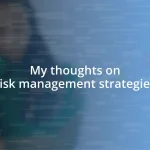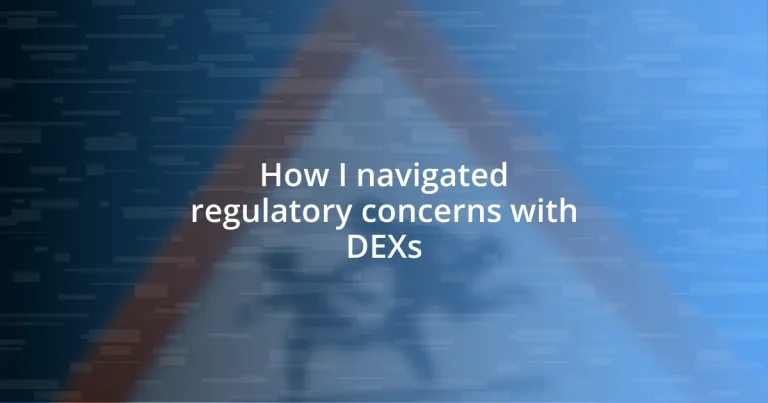Key takeaways:
- Understanding the evolving regulatory landscape is crucial for DEX users, as it affects trading strategies, privacy, and compliance obligations.
- Proactive engagement with regulatory authorities and community discussions can foster mutual understanding and shape compliant trading practices.
- Future trends indicate a move towards harmonized regulations, self-regulatory organizations, and enhanced consumer protection, aiming to balance innovation with user security.
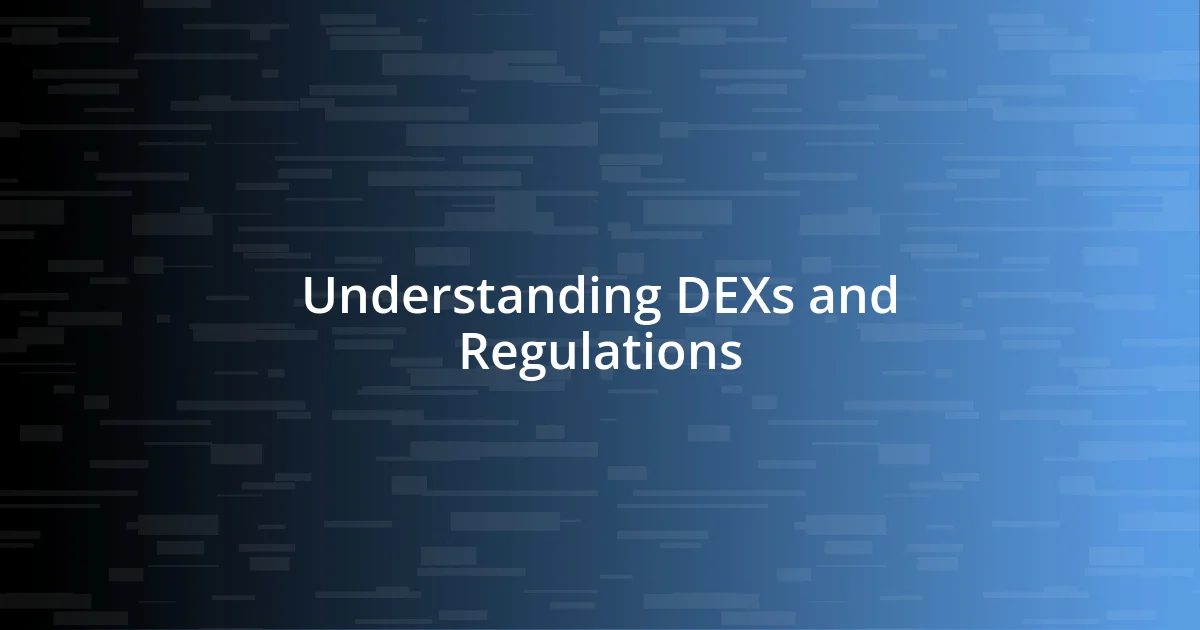
Understanding DEXs and Regulations
Decentralized exchanges (DEXs) operate on a foundation of blockchain technology, allowing users to trade directly with one another without the need for intermediaries. I vividly remember the first time I used a DEX; it felt like stepping into a whole new world where I was in control of my assets. But as I navigated this space, I quickly realized that with freedom comes a complex landscape of regulatory concerns.
Regulatory bodies across different jurisdictions view DEXs through various lenses, which can create a sense of unease for many users. I found myself pondering questions like, “How will new regulations impact my trading strategies?” This uncertainty was palpable, especially as I watched some of my peers hesitate to dive into DEXs because of the fear of future legal repercussions. The reality is that while DEXs offer unparalleled privacy and control, the evolving regulatory framework can sometimes feel like a shadow looming over our transactions, making it vital to stay informed.
From my experience, understanding the regulations surrounding DEXs isn’t just about compliance; it’s about embracing the responsibility that comes with decentralized finance. There were times when I felt overwhelmed by the constant changes in the landscape, but I reminded myself that being proactive in understanding these regulations would empower me in my trading decisions. Ultimately, balancing innovation with compliance not only safeguards my interests but also strengthens the trust within the crypto community.
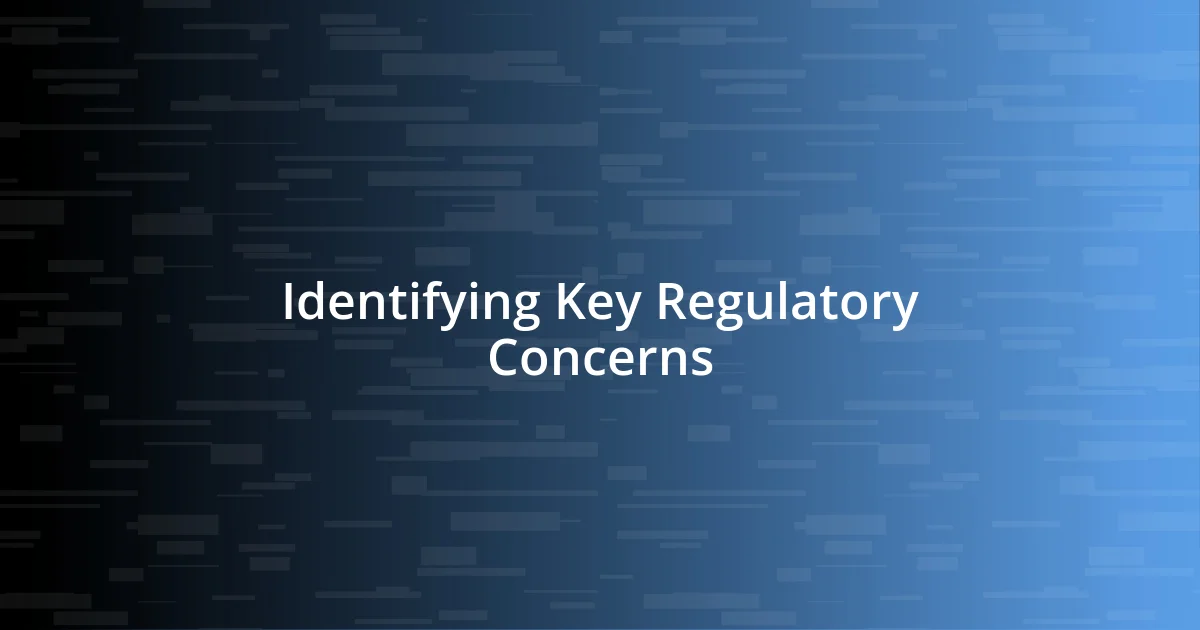
Identifying Key Regulatory Concerns
When I first started exploring DEXs, the sheer volume of regulatory concerns felt overwhelming. One of the major issues I encountered was the lack of clarity surrounding definitions of securities and whether certain tokens traded on DEXs fell into that category. I distinctly remember analyzing the terms of service of various cryptocurrencies, often feeling like I was deciphering a foreign language. It was a learning curve that highlighted the importance of doing my homework before diving deeper.
Another concern that kept me awake at night was the potential for stricter KYC (Know Your Customer) regulations. Initially, the privacy afforded by DEXs was one of their biggest draws for me. However, as major regulatory agencies began to take notice, the specter of mandatory identity checks loomed large. This prompted me to ask myself, “Will I still enjoy the same sense of anonymity if this becomes commonplace?” It made me realize that I needed to stay vigilant for changes and actively engage with each development.
Lastly, the issue of compliance with anti-money laundering (AML) laws cannot be ignored. Many DEXs promote themselves as decentralized and trustless, which can often lead to friction with regulatory viewpoints focusing on user accountability. I vividly recall a moment when I had a conversation with a fellow trader about whether DEXs could coexist with regulatory frameworks; it was eye-opening to consider the possible compromises between innovation and regulation. It’s important for anyone involved in the DEX space to assess how emerging regulatory guidelines might affect their trading landscape.
| Regulatory Concern | Impact on DEX Users |
|---|---|
| Definitions of Securities | Lack of clarity impacts trading strategies. |
| KYC Regulations | Possible loss of privacy in transactions. |
| AML Compliance | Increased scrutiny on user activities. |
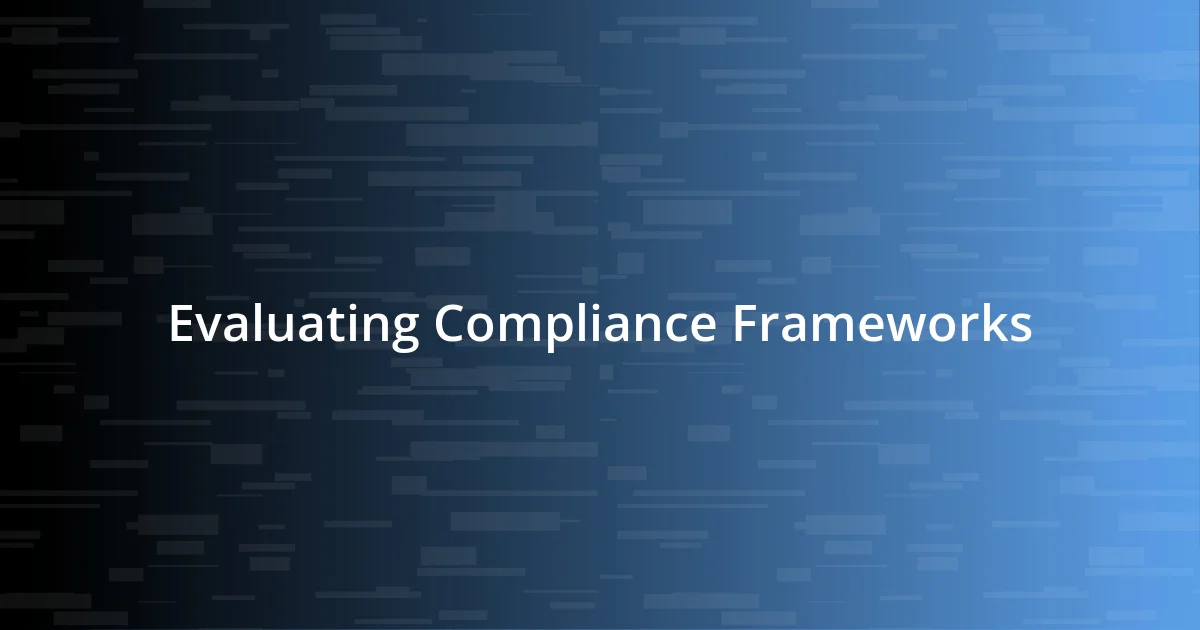
Evaluating Compliance Frameworks
Evaluating compliance frameworks for DEXs entails a careful balance of understanding legal obligations while remaining true to the innovative spirit of decentralized finance. It’s a bit like walking a tightrope; you want to maintain your freedom to trade while ensuring that you’re not blindsided by regulatory changes. I recall one particularly frustrating afternoon spent poring over a dense report on the regulatory landscape, feeling a mix of confusion and determination. It struck me how regulators often seemed to lag behind technology, creating a chasm between innovation and compliance that we have to navigate artfully.
- Understand Your Jurisdiction: Regulations vary significantly between regions, so knowing local laws is crucial.
- Keep Updated: Regulatory environments are dynamic. Following news and trends helps you stay ahead.
- Engage with Compliance Solutions: Utilizing software that assists with compliance can ease your burden and mitigate risks.
- Document Everything: Maintaining thorough records of transactions offers protection and transparency.
- Network with Peers: Connecting with others in the DEX space can provide insights and shared experiences on compliance challenges.
As I reviewed the frameworks in place, I felt a pivotal shift in my approach—choosing to see compliance not just as a hurdle but as an integral part of my trading strategy. I remember discussing compliance with a mentor, who shared how he considered it a roadmap rather than a restriction. This perspective allowed me to embrace the opportunities that arise from a compliant operation. By proactively evaluating these frameworks, I could not only protect my assets but also contribute to building a trustworthy environment that fosters growth and innovation in the DEX landscape.
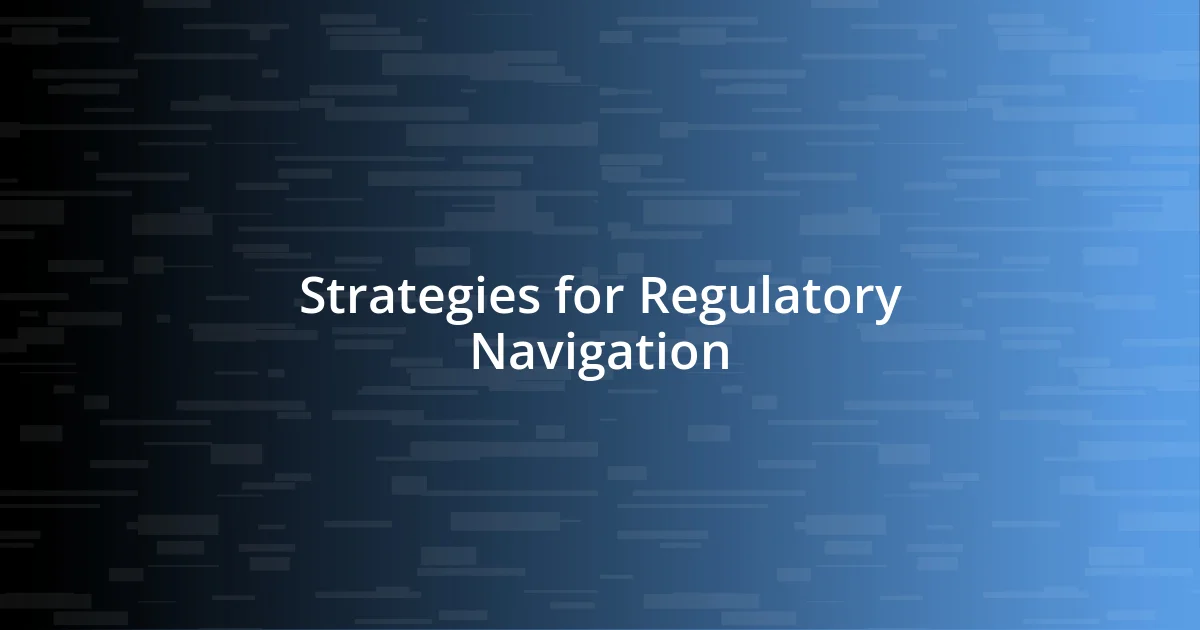
Strategies for Regulatory Navigation
Navigating the regulatory landscape for DEXs requires a proactive approach that combines vigilance and adaptability. I recall a time when I made it a habit to dedicate a few minutes daily to skim through regulatory updates and news articles. It was eye-opening to see how quickly things could change, and I often wondered: “How can I leverage this information to stay ahead?” Staying informed became a game-changer for me, allowing me to adjust my strategies on the fly and keep my trading activities in line with emerging regulations.
Another effective strategy I found was fostering open communication with regulators and compliance experts. One day, I took the plunge and attended a local meetup where industry professionals discussed the evolving regulations. I remember feeling a mix of excitement and apprehension as I shared my experiences and questions. What struck me was how willing they were to engage in dialogue. This interaction not only clarified many of my doubts but also enabled me to tailor my trading practices based on real-world expectations. It highlighted for me the essential role of community in navigating regulatory waters.
Finally, I realized that embracing technology was vital for managing compliance seamlessly. After experimenting with various compliance tools, I settled on a software solution that helped automate record-keeping and transaction monitoring. Initially, I felt overwhelmed and skeptical about whether it would actually make a difference. The relief I felt when I finally saw how much easier it made my life was unforgettable. I often ask myself, “What would my trading experience be like if I hadn’t integrated these tools?” It’s clear that leveraging technology not only simplifies compliance but empowers traders to focus on what they do best—trading.
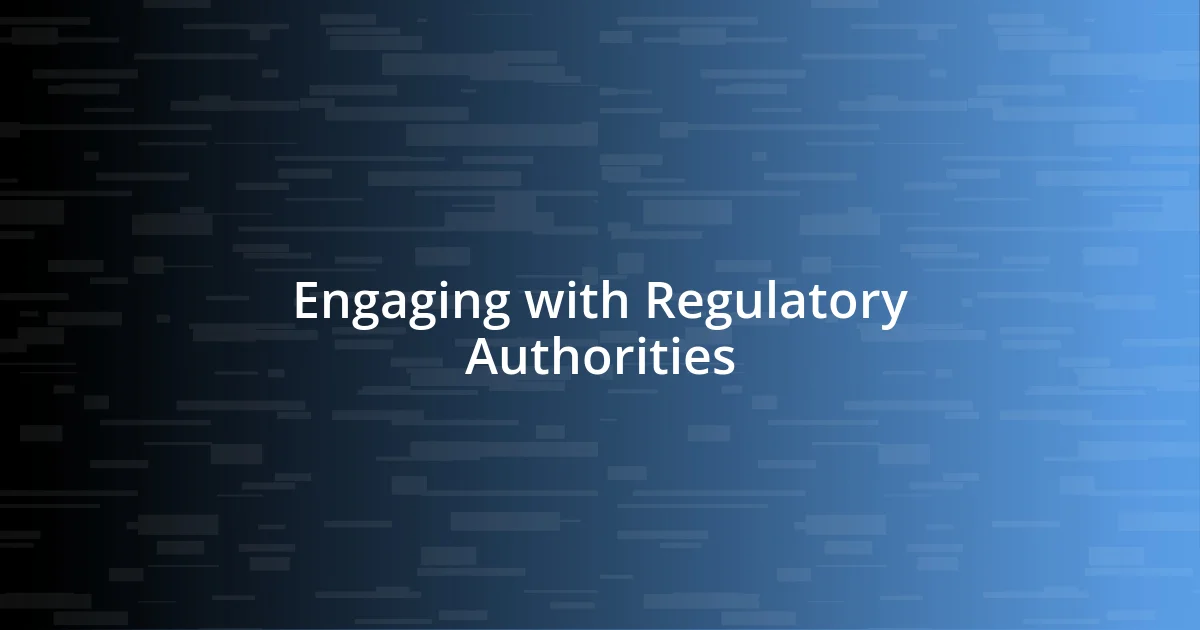
Engaging with Regulatory Authorities
Engaging with regulatory authorities was a learning experience for me. Initially, I found the prospect daunting, but I remember my first outreach to a regulatory body. I approached it like a conversation over coffee rather than a formal meeting. I shared my understanding of decentralized exchanges (DEXs) and expressed a genuine interest in learning how we could collaboratively create a bridge between innovation and regulation. I was pleasantly surprised by the positive response. It showed me that regulators often appreciate when you engage respectfully and seek mutual understanding.
As I navigated this landscape, I learned the importance of tailored communication. In one instance, I drafted a comprehensive letter outlining my business model and compliance strategies, seeking feedback. Facing the blank page was intimidating, but I kept reminding myself: “What if this feedback could shape my approach positively?” The insights I received not only refined my strategies but also established a rapport with the authorities, turning them from distant enforcers into approachable allies in my journey.
I also discovered the power of participating in workshops and forums hosted by regulatory bodies. Engaging in discussions with industry experts allowed me to voice my concerns and receive guidance directly. I felt invigorated, especially during a session where I had the chance to ask a question about upcoming regulations. It hit me then—being part of these conversations is crucial. It’s a reminder that regulators aren’t just gatekeepers; they’re partners in crafting an environment where innovation can thrive within safe boundaries. Wouldn’t you agree that building a constructive dialogue could benefit everyone involved?

Documenting and Reporting Requirements
When it comes to documenting and reporting requirements for DEXs, I learned early on that accuracy is non-negotiable. There was a moment when I mistakenly overlooked a vital reporting deadline, and it felt like a bucket of cold water hit me. I had to scramble to gather the required documentation, which made me realize that detailed record-keeping isn’t just a chore—it’s an essential part of maintaining trust and integrity in the trading world. How many times have we overlooked seemingly minor details in high-stakes situations?
As I navigated the labyrinth of compliance, I developed a structured approach to documentation. Utilizing spreadsheets and project management tools transformed my workflow. Once, during a review session, I discovered discrepancies in my transaction logs. The feeling of uncertainty was palpable until I realized that my ongoing habit of documenting every transaction meticulously allowed me to trace back my steps. It was a small victory that reinforced the importance of routine in this unpredictable environment. Have you ever had that moment when a system you established saved you from a potential setback?
Another lesson that struck me hard was the significance of transparent reporting. Engaging in open dialogue with auditors and stakeholders became a game-changer. In one instance, I invited an auditor to review my processes. The initial nerves faded once we started discussing my practices openly—what a relief it was to embrace vulnerability and seek constructive feedback. This proactive approach not only improved my own understanding but also built a solid relationship that I could rely on during future audits. Isn’t it empowering to turn what could be a stressful encounter into an opportunity for growth?
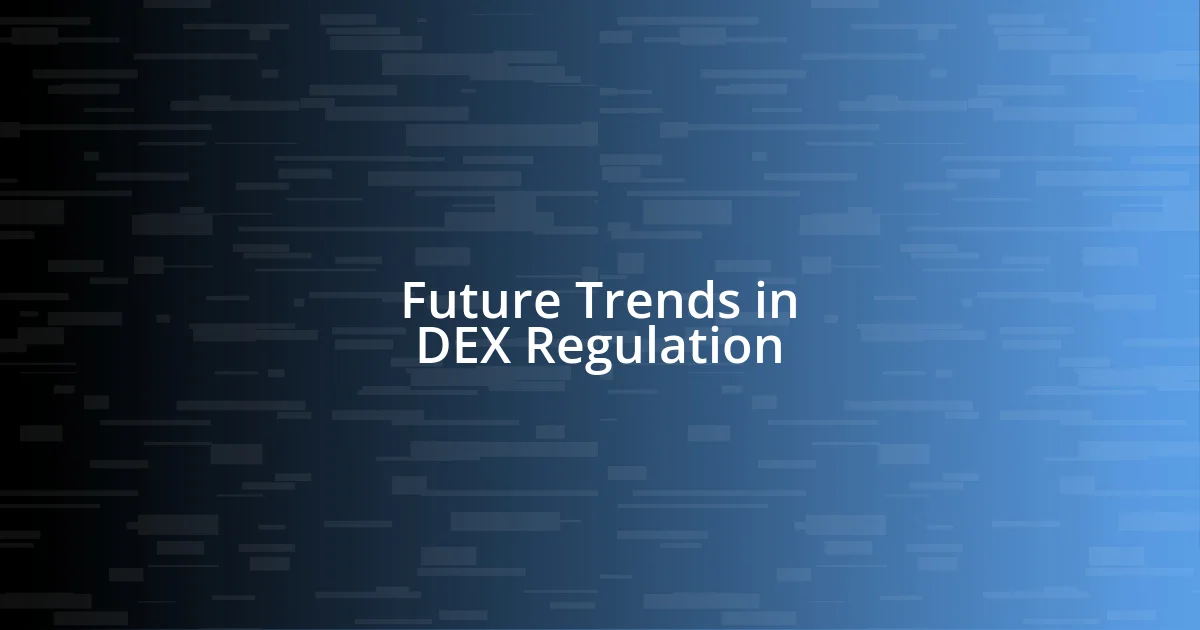
Future Trends in DEX Regulation
As I looked ahead at the regulatory landscape for DEXs, a recurring theme that stood out was the increasing move toward harmonization. Different regions are starting to align their regulations, which can simplify compliance significantly for operators like me. I recall a moment of relief I felt when I learned that some countries were adopting frameworks based on best practices rather than trying to reinvent the wheel. Wouldn’t it be enjoyable to navigate a more unified approach across jurisdictions?
Another trend I noticed is the rise of self-regulatory organizations (SROs) within the DEX ecosystem. I remember when I participated in a roundtable discussion where this topic blossomed into an enthusiastic debate. Many industry insiders, including myself, felt that having a self-regulated body could enhance credibility while allowing for more nimble responses to emerging technologies. Can you imagine the shift in dynamics that could happen if we, as industry participants, could set and uphold our own standards?
Finally, I see a growing emphasis on consumer protection regulations as the market matures. It was enlightening to follow discussions on how exchanges can bolster user security without stifling innovation. One suggestion that resonated with me was implementing educational initiatives for users, enabling them to make informed decisions. Have you considered how empowering users can ultimately benefit the entire DEX ecosystem? The potential for growth seems limitless when we prioritize user knowledge alongside regulatory compliance.






